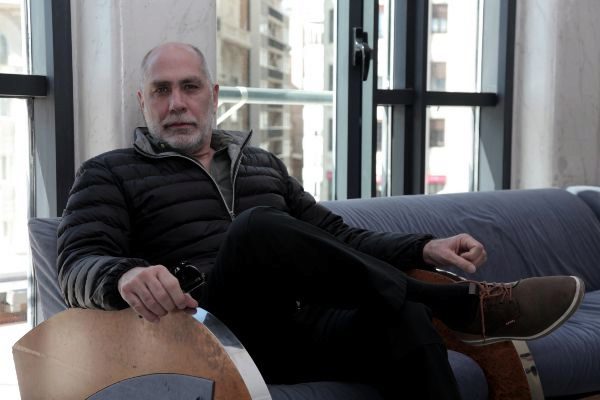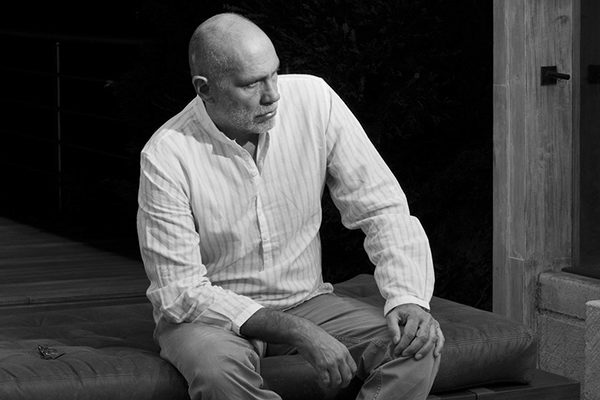Guillermo Arriaga: "How many fortunes of old money in the US aren't made from plunder, looting, slavery...?"

There is a thread that links Fortuna , by Hernán Díaz (Anagrama), with Carnicero , by Joyce Carol Oates (Alfaguara), and with El hombre , by Guillermo Arriaga (Alfaguara) : all three are great novels that portray the origin of old money in the United States through enlightened and brutal characters.
In El hombre , the text is recognizable to Arriaga's longtime readers and to viewers who filmed his scripts: fractured between voices and perspectives, expressionist and epic . But the setting is no longer New York or New England, as in Fortuna y Carnicero , but Texas, during the era of the Apache-Mexican-American wars.
- I think of Guillermo Arriaga, and the idea that comes to mind is that of a hyperrealist writer of urban stories. But here there are no dark alleys, but rather distant horizons and ample countryside.
- Actually, I've always been quite the recluse. As a kid, I was a bit of a street urchin; I knew all the public transportation options, and my vision of the city is shaped by trips on the subway and public buses. I haven't been quite so street urchin for a while, but I still see myself that way... Well, what I want people to say about me is that I'm a writer who's both street-wise and bush-bound. My colleague Álvaro Enrigue wrote the history of the Apaches in Mexico before anyone else. Or, at least, he was one of the first. He did research as a child and wrote a great book. I've been there since I was a child; I grew up in Apache territory. I've been told their stories. There's no research in my book; it's my life. I know what it's like to chase a deer, to see its tracks and read them, to know if the deer is young or old, if it's a female or a male.
- What kind of soil is it?
- It's a desert, but where there's water, it's very fertile. There are walnut trees, pecan trees, oak trees, and the water is the color of the Caribbean. It's incredible, clear, blue. It's beautiful. And you search the earth and you'll find arrowheads.
- And what about the Apaches? Do they have an attitude of distrust toward the world?
- There aren't any left. Well, there's a community of 100 people, displaced to the south. They were exterminated.
- The book, at its core, raises the suspicion that there is no success without guilt.
- More than success, it's fortune that invites that question. The question is always about the origin of fortune. Is there blood at its source? There are fortunes that don't have that, I know, but in the US, where there's an obsession with old money... How many of those fortunes aren't made of plunder, looting, slavery...? I don't believe Amancio Ortega based his fortune on plunder and murder.
- That theme is present in American literature. It could be present in European literature, but it's rarer.
- Because America is a new territory. Understand me, it's new for transplanted Europeans. The United States and Mexico are countries that were 10, 20 years old at the time of this novel. Brutality was part of the construction of new countries. Everything had to be done. During independence, volcanic magmas collided, very harsh forces. And the 19th century was very cruel.
"Brutality was part of the construction of the new countries of the Americas. The 19th century was very cruel."
- What does this more or less historical novel say about the world in 2025?
- This book addresses the founding sins of the United States and, in part, those of Mexico: slavery, the genocide of Native Americans, and the dispossession of Mexican territory. These are three founding sins that continue to weigh heavily on us. The Black population can't find its place; they continue to suffer from a lack of opportunities. Mexico continues to send people north. And the Native Americans are a festering wound. They wiped them out. Mexico wiped them out too. Well, the Native Americans who had a sophisticated culture, the Mexica and the Tlaxcalans, were respected. Those who didn't have poets or astronomers or build cities on lagoons were extinguished.
- What would be the reasonable response to these blames?
- The response we see is defensive. I lock myself away within my social group, race, nationality, religion, and anyone outside is my enemy. When you don't find opportunities in life, you start blaming others. In developing countries, the white lower classes blame those who are different for their failures, not the system.
- In Mexico, the plundering of Texas...
- Not from Texas. From New Mexico, Colorado, California, Arizona, Nevada, Utah, Arkansas... 2.7 million square kilometers. A territory as large as Argentina.
"In first-world countries, the white lower classes blame their failures on those who are different, not on the system."
- What I was getting at was whether it's a very present issue in national identity.
- Yes. It's a very serious grievance we can't stomach. And for Mexico, there's a moral interpretation, a sense of injustice. Those who dispossessed us were the settlers whom Mexico invited to those territories to defeat the natives. They turned against Mexico, and Mexico considers it a betrayal; the settlers said the Mexicans had abandoned us. It's true that Mexico was torn apart by its internal wars.
- Without this dispossession, would the history of poverty in Mexico have been different?
- I don't think so. I think Mexican corruption is an endemic evil. Maybe it comes from the Spaniard who collected his fortune and left. Mexican politicians make the most of it, take millions of dollars, and if they don't, their friends tell them: "You squandered your inheritance." I don't know if those territories, with their oil, would have made us a richer country.
- Is it a less cruel culture?
- With slaves, yes. Independence abolished slavery. But we exterminated the Apaches with the same joy as the Americans.
- How long has Mexico had leftist governments? Almost a decade?
- We're going for eight years. We've been in charge of Mexico City's government for 30 years. There have been ups and downs, but I think the city has been well governed. Marcelo Ebrard did a very good job, Claudia Sheinbaum, too... Am I happy with the last six years in the federal government? Not entirely. There were praiseworthy things, like the increase in the minimum wage... And there were serious mistakes that I hope Claudia Sheinbaum will reverse.
"Mexican corruption is endemic. It may have come from the Spaniard who collected his fortune and left."
- What was the difficulty of this novel?
- It was a novel with a lot of macramé, a complicated weaving. The novel needed many voices, but I knew that polyphonic novels carry a risk: that all the voices sound the same and contribute nothing. Each voice must be distinct, each voice must contribute something. Note that each character has a different vocabulary, voice, rhythm, and syntax. That entails many difficulties.
- How does The Man resemble your previous books? How does it expand on them and how does it refute them?
- It increases the risk. I want each novel to be more daring, but I'm also afraid of breaking the thread. That the publisher will tell me, "That's a great risk," but then ask me to find others for the next book. That the reader will tell me, "I didn't understand anything." Nothing is guaranteed in this line of work. I've met writers with many readers who now self-publish. The possibility of that happening to me exists. But a career without risks doesn't seem meaningful to me. And refuting... I wouldn't want to refute anything I've written. I'd like to open new avenues that connect with previous books. Writers have fingerprints.
- What are yours?
- The characters who are on the edge, who hover on the brink of the abyss, who flirt with the possibility of throwing themselves off. They are paradoxical and contradictory. Lloyd is ruthless, cruel, and brutal. But people love him. His ex-wife takes care of him as he's dying, slaves give their lives for him, and his children see him as a great father. Nothing seems sadder to me than a missing father or an abusive father. Lloyd is a character with a mission: to create an empire. I'm very drawn to these larger-than-life characters. I like them.
"Nothing is guaranteed in this job. I've met writers with a large readership who are now self-publishing."
- How did it go with them?
- My father was one of them. He bought a small orchard next to the house where Sor Juana Inés de la Cruz was born. There was a tiny museum there. Would you believe it was my father who convinced the government to build a huge cultural center? Then he decided that this cultural center had to have a locomotive. Bringing the locomotive was like Fitzcarraldo . When he died, about 8,000 people came to the tribute. He was a force of nature.
- And how did it go with him?
- He was the best father in the world. Both of them were. Present, generous... In that sense, he's nothing like Lloyd.
elmundo







